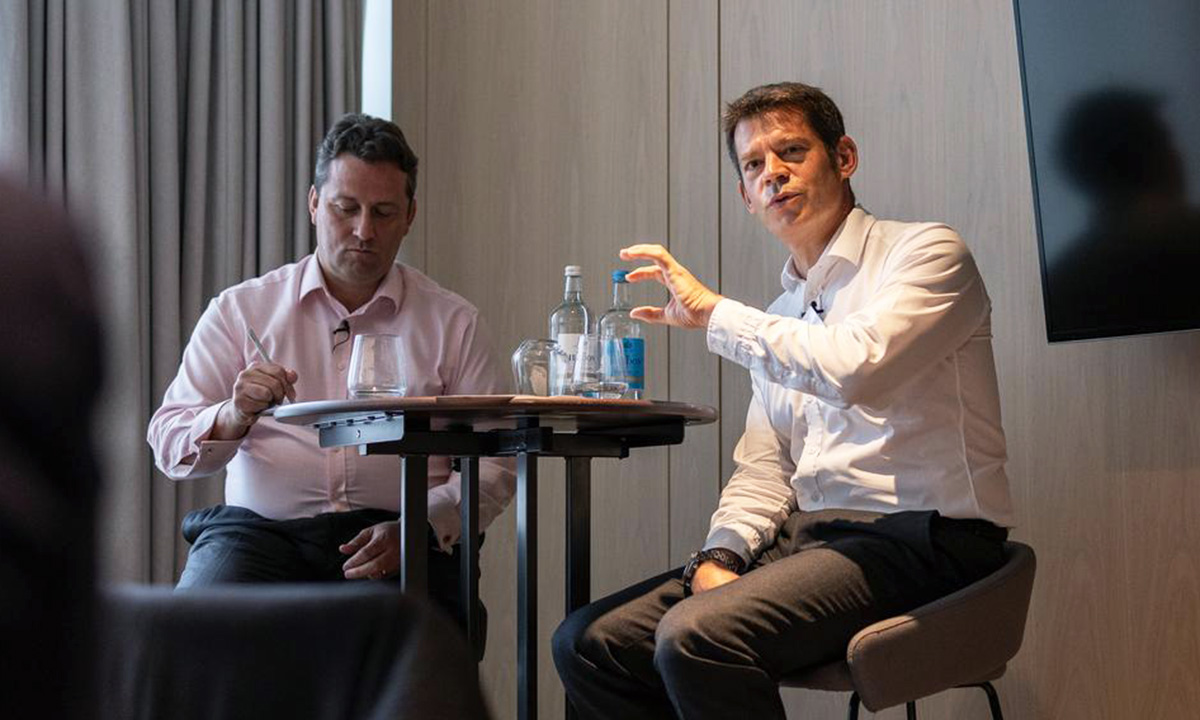The burdens of being the boss may not worry many rank and file workers, but they are getting bigger all the time and can have a big impact on a company’s performance and public reputation. That may explain why the average tenure of a UK chief executive has declined recently to a little over five years, according to executive search firm Spencer Stuart.
We convened a group of senior leaders on June 20, 2023, to examine the often distressed state of the modern CEO. In an engaging conversation with Oliver Wyman’s boss, Nick Studer, former Nationwide Building Society CEO Joe Garner shared insights from his executive experience about what CEOs can do to keep an even keel – and how boards can lend a helping hand. Here are a few of our key takeaways:
- A CEO’s burdens really are growing, but they contain elements of the solution. Today’s boss can’t focus solely on shareholder returns, even if she or he can’t afford ignore them. They have to stay on top of ever-accelerating technological change. The pressures of climate change and demands for greater diversity to better reflect today’s society mean almost every decision a CEO takes can be looked at through an ESG lens. Media scrutiny of missteps, real and perceived, is more intense than ever, which can escalate problem issues in a flash. And on top of everything, the pandemic has blurred the line between our work and private lives and changed habits – just ask any CEO who’s tried to coerce people back to the office. The silver lining of these changes is that they’ve put a spotlight on the importance of values like empathy and compassion, on emotions rather than just facts. That’s something leaders should lean into.
- The job demands just as high of an EQ as an IQ. Most CEOs recognise the need to develop wider professional skills than the track they started on, whether that was product, marketing or finance. Yet many overlook the soft skills crucial for cultivating interpersonal relationships and building confidence. People want to know what makes their bosses tick, to build a connection that can form the basis of trust. That demands that a leader be accessible, walk the shop or office floor, and communicate openly and regularly with employees, not just senior management. Bosses don’t just set the tone for the organisation; they need to listen as much as they speak. Joe quoted the late US General Colin Powell, who said that if soldiers stop coming to you with problems, “they have either lost confidence that you can help them or concluded that you do not care. Either case is a failure of leadership."
- Be very intentional about the way you interact with the board. They can be very helpful to the CEO, both personally and professionally, but those relationships can be delicate. There’s a fine line between a chair coaching a young CEO and directing him or her. Failure to strike the right balance can create pressure and undermine the executive’s confidence. Non-executive directors should both challenge and support the CEO, but perceptions about that balance depends on where you’re sitting. Kicking the tires of the business to get a better sense of what’s going on can provide valuable insight, but NEDs should never blindside a CEO at a board meeting. On a personal level, CEOs may welcome attention from NEDs wanting to know how the boss is holding up under the pressure and how things are with their family. Joe said that kind of outreach gave him license to be a more-rounded human and not a delivery machine.
- Don’t tolerate bad behavior, exhibit good. A leader’s personal behavior should be beyond reproach, but it doesn’t stop there. A CEO can’t afford to turn a blind eye to harassment, sexist or racist comments, or other symptoms of a toxic workplace culture. Employees won’t stand for it, the media will pounce on it, and the reputational damage can harm the company’s franchise. If leaders want their companies to reflect society – and they should – they need to pay more than lip service to the principles of diversity, equity, and inclusion. Joe recounted how he hesitated to make any public comment in the immediate aftermath of the 2020 killing of George Floyd, feeling he didn’t have the right language, but eventually published a blog and set up a Black Lives Matter mentoring council to start a conversation about racial discrimination and how the company should address it.
- Practice your own self-care. Being CEO can be both the most visible job and the loneliest. The workload never lets up, you’re expected to be always on, and yet there are few people you can really open up to on sensitive issues. The board owes its fiduciary duty to the organisation, not to you, and direct reports are off limits. A CEO needs to have a few safe harbours – a professional mentor or former colleague, say, not a boss – who he or she can be vulnerable with, ask for advice, or simply vent frustrations. Everyone has doubts, or should have. Instead of suppressing them or being paralysed by them, a leader should have the humility and curiosity to acknowledge those doubts and question their decisions. That builds the kind of confidence you can project to your workforce and the market.

